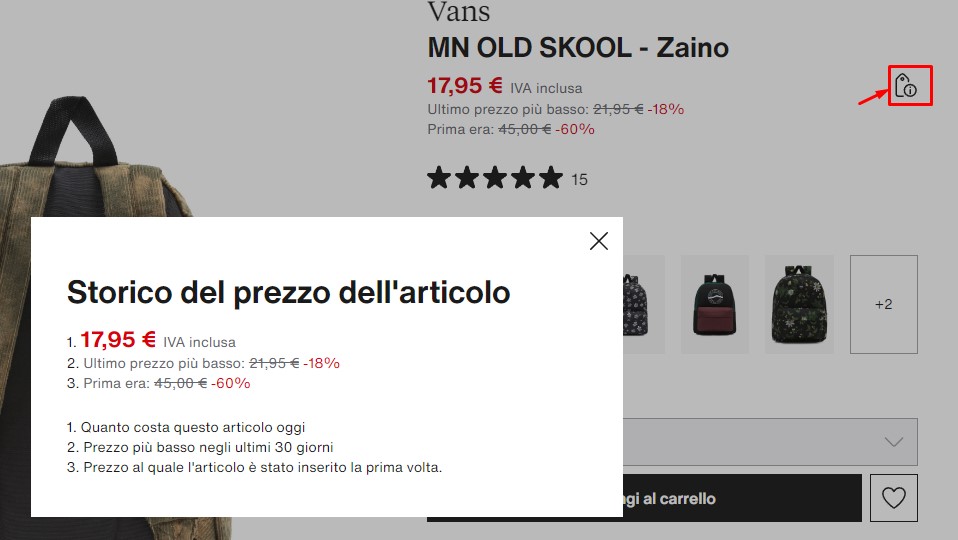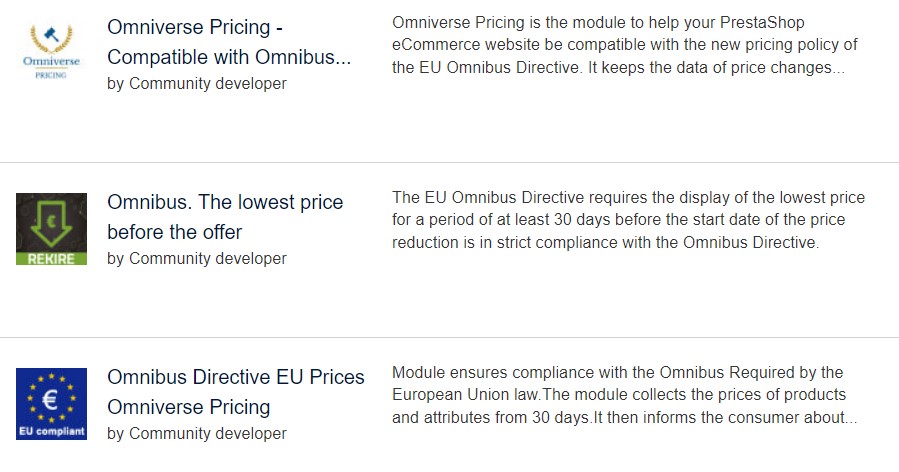- Tecnoacquisti.com
- Normative e Privacy
In February 2023, the Council of Ministers approved the implementation decree of directive 2019/2161, called the Omnibus Directive , which introduces important innovations regarding the protection of consumers with regard to unfair commercial practices, in particular in reviews and promotional offers.
As early as May 2022, the European Union has decided to protect buyers. The goal is to make reviews authentic and a trusted tool for consumers and put an end to bad practices in offers. In this article we will see the measures reinforced by this law, what will change for ecommerce and how to adapt to the Omnibus Directive.
Index
- The characteristics of the Omnibus directive.
- The authentic and verified reviews.
- Price management and control.
- Discounts on goods offered to customers
- What changes for those who manage an e-commerce
- Self-managed or "Verified" reviews
- The consequences for those who do not comply with the Directive
- Conclusions
The characteristics of the Omnibus directive
The EU directive 2019/2161 , which entered into force on 22 May 2022 , has as its main objective the protection of consumers who buy on the Net and sanctions those who implement unfair trade practices, such as buying positive reviews .
Article 17 of the Omnibus Directive reads as follows: " Existing EU consumer protection rules should be modernised. As digital tools are constantly evolving, it is necessary to adapt EU consumer protection law" .
So let's see how the main objective of the Directive will develop.
The Omnibus Directive: the authentic and verified reviews
In fact, around 300 websites were analysed. Of these, 104 did not provide information regarding how reviews are collected. On the other hand, 118 did not mention the type of measures adopted in the case of false reviews and 176 gave the possibility to buy reviews .
An alarming percentage emerges from these data: 55% of the sites analyzed are not in compliance with the European directives for consumer protection . 18%, on the other hand, leave doubts about the real authenticity of the reviews published.
The Omnibus Directive , therefore, wants to push those who sell online (it applies to all online reviews, including of restaurants and other offline businesses) to provide clear and truthful information about the checks carried out on reviews and the way they are processed. It should also be clarified whether both positive and negative reviews are made available to consumers, whether the former are paid for or whether they are influenced by any type of contractual relationship.
Furthermore, merchants must not use unfair commercial practices such as, for example, guaranteeing compensation to users in exchange for issuing a positive review of a specific product or service. In fact, it is also common practice on review channels such as Trustpilot and the like to offer free products or services to the most active users on these review portals, and too often the same users offer themselves for this purpose.
Not least there are online services where you can buy reviews for the most diverse portals including Google, Facebook etc ... A real market that I have already talked about in the past in the article: Are user reviews reliable?
Management and control of prices and discounts
Article 2 of the Omnibus Directive is dedicated to online discounts . This passage specifies how it is necessary to indicate, in each price reduction announcement, the previous figure applied by the seller before the discount was made.

In the image an example of how Zalando has transposed the Omnibus Directive.
When we talk about the previous price, we mean the lowest price that the operator has offered in a period of no less than 30 days before the reduction. Here we have the real novelty, namely having to indicate the price changes of the last 30 days.
In practice, the discount must always be directly related to the lowest price reached by the product or service on sale in the last 30 days. To give an example: a product has a standard price of 100 euros , the retailer decides to raise it to 120 euros and after just two days applies a 20% discount. The final price cannot be 96 euros, but 70 euros . This is because the 20% discount must be applied to the figure of 100 euros, i.e. the lowest price that the item has reached in the last 30 days.
This clarifies how the directive prohibits fictitious price increases and false discounts . We specify, right from the start, that there are some exceptions such as, for example, those relating to products that are about to expire or to customized offers (aspects that the complete legislation clarifies in detail and which we will go into more detail in the course of the article).
The new rules are making it difficult for those who own and manage e-commerce , but they also offer excellent marketing possibilities. In fact, transparency towards consumers can only increase the trust that the latter perceive towards a company and a brand . Currently there are few addons for PrestaShop that allow us to comply with this aspect of the directive.
Discounts on goods offered to customers
The rule imposed by the Omnibus Directive on prices must be applied every time the seller offers a promotion to customers, whether it is a discount that leads from one price to another, or when the reduction offered is a percentage.
In both cases, the seller must indicate the starting price of the product or service offered (which, as we have said, must refer to the last 30 days prior to the date of application of the discount).
The main reason for this change is to prevent the price from growing and being inflated dramatically by the seller to give the customer the impression of being faced with an unmissable discount, which in truth is a real deception.
Cases where the Omnibus Directive does not apply
Although the legislation is very detailed and complete, it does not apply in all cases. In fact, there are exceptions in certain cases. As happens in the case of products subject to perishability or close to the expiry date . Furthermore, those sales in which the price change does not refer to discount operations in progress are not taken into account.
Furthermore, the Directive is not applied in three other cases: when you are faced with combined offers (with the classic get three and pay one), personalized coupons or loyalty cards and when you do not promote the offer with words such as " lowest price" . When one of the above occurs, the Omnibus Directive on prices and discounts does not apply. In fact, the consumer does not risk being misled.
The Omnibus Directive concerns only the sale to the final consumer, therefore B2C ecommerce and does not apply to intercompany trade, ie B2B.
Omnibus Directive: what changes for those who manage an e-commerce
Anyone who owns an e-commerce and wants to publish customer reviews and make them visible must explicitly indicate what actions they take to ensure that these feedbacks are real and come from buyers who have actually purchased or use a specific product/service .

In the image above, an example of a review released by one of our customers on Tecnoacquisti .com in compliance with the Omnibus Directive. It should be noted that since it is B2B, the directive would not apply.
Not making this communication transparent is considered to all intents and purposes a deceptive and unfair practice. This does not mean that those who manage an online store must necessarily filter the reviews , but must still report that their e- commerce does not carry out these checks and the management methods applied.
Anyone who already uses a review collection system or uses plug-ins should ask themselves the following questions:
- Does the system used specify the type of reviews collected?
- Are the reviews verified?
- Does the system indicate what are the methods for verifying the authenticity of the reviews published?
Ultimately, it is always necessary to rely on modules or platforms that guarantee ecommerce managers that they can be sure of obtaining authentic and properly verified reviews . This does not mean that the control could not also be manual, in fact the important thing is to clearly indicate on the review that it is a verified purchase and how to manage the reviews, a simple disclosure as is the case for the Cookies Policy, Privacy Policy and the Terms of Sale.
Self-managed or "Verified" reviews
Regarding the reviews it is very simple to adapt, external review systems such as Tripadvisor, Trustpilot, Verified Reviews, Feedaty, etc. have already adapted, even if I do not recommend their use as you lose ownership of the reviews received, they are provided sensitive corporate data to third parties and the integration impacts on the loading times of our ecommerce including Web Vital metrics thus worsening the user experience, without this providing real benefits.
The legislation does not impose the use of external and independent collection services , where abuses have not been lacking, even if the wording " verified reviews " is often used in advertising these services, in reality this has nothing to do with the Omnibus directive. This is just a marketing ploy. The directive lays down rules and obliges the user to clearly communicate the method, it does not impose a collection and management system which therefore can also be completely self-managed. Controls and sanctions will take care of enforcing the legislation.
An excellent module for PrestaShop is definitely Trusted Reviews by ETS-Soft. The same one we chose for Tecnoacquisti .com.
In addition to informing about the source of the reviews and how they were obtained, e-commerce managers must also indicate how they are treated. The European Union Directive has given precise rules on evaluation: the buyer must have access to the calculation of the score . This information should be open to buyers through the same window where reviews are posted. Notifying them that these have been issued by real users, without the necessary checks and verifications having been carried out, is considered an unfair and punishable practice.
The consequences for those who do not comply with the new Omnibus Directive
Those who do not comply with the new rules imposed by the Omnibus Directive can face very onerous penalties . In fact, fines corresponding to 4% of turnover or 2 million euros can be imposed if it is not possible to access precise information on annual revenues.
Furthermore, each member state of the European Community has the possibility of increasing the sanctions with respect to those indicated in the Directive . Here are the different examples in this regard:
- in Germany one can receive an Abmahnung . It is a letter of warning which aims to put an end to an unfair behavior performed in the context of online sales and which entails a fine;
- in France, in addition to the fine, you can also suffer a criminal sentence with imprisonment. The fine is around 300 thousand euros, but can grow up to the sum corresponding to 10% of the average turnover of the last three years or 50% of the costs incurred for the promotion or other actions used to generate the offence. Furthermore, in this State one can also undergo a professional disqualification for a period of 5 years;
- in Spain not respecting consumers' rights is punished with a fine ranging from 150 to 10,000 euros. This fine can grow from 2 to 4 times the benefits gained through such an infraction;
- in Holland the fine can reach 10% of the annual turnover, if the law has been broken several times;
- in Poland you can receive a fine equivalent to 10% of the previous year's turnover.
Conclusions
The Directive aims to prevent two unfair commercial practices that are very widespread online, this does not mean that from now on reviews will be more reliable , unfortunately nothing can be done by legislation on the lack of competence of those who issue them and in reality little even on the abuses that will continue anyway, but now becoming clearly illegal. In reality, these practices were still prosecutable, but with very long and complex investigations.
In any case, the control of infringements is not simple , not only on the part of the competent authorities, but also on the part of Marketplaces such as Amazon where for some time now dishonest merchants have been implementing a new practice to circumvent the legislation, simply by exploiting the possibility of to sell two different products in a single product sheet, as if it were a variant of color or size. In this way, the "good" and cheap product A gets the positive reviews instead of the poor product B , exploiting a flaw in the Marketplace itself and misleading the customer, risking in any case being banned for life by Amazon.
The reviews thus obtained are in compliance with the Omnibus Directive as they are real purchases of product A, but not if the user believes that they refer to product B. I hope this practice will be banned as soon as possible by Amazon, but it is said that the system is used on other ecommerce and a similar system can easily be used also with the "verified reviews" services as the check is carried out on the automatic sending of the order data to the service in use. Pure Marketplaces like Ebay where positive User Feedback is a very important metric, are not exempt from abuses, despite the commitment to limit them and to ban those who carry out unfair practices.
Complying with the legislation is important to increase the quality of one's commercial offer and transparency towards one's customers , it is difficult for dishonest traders if not real scammers to find some obstacle in this legislation. Verifying that a review has really been released by a real buyer and without there having been an agreement of any kind requires very complex investigations, similarly to checking the price history, consequently the bodies in charge will move following reports and disputes.
Author: Loris Modena

SENIOR DEVELOPER
For Ind Loris Modena, owner of Arte e Informatica , he began working in the IT sector in 1989 as a systems engineer responsible for the maintenance and installation of IT systems. He began programming for the web in 1997 dealing with CGI programming in PERL and later moving on to programming in PHP and JavaScript. In this period he approaches the Open Source world and the management of Linux servers.


